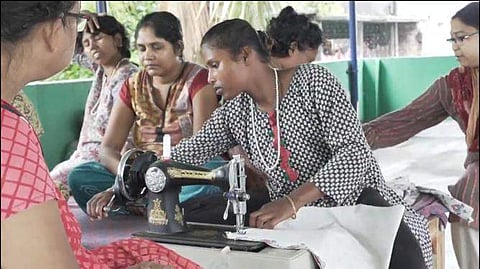

Mental health is still an unknown domain for most in the country — we don't have the right information, we don't know how to treat the illness and eventually, the patient becomes a burden which leads to abandonment. Dr Suchandra Brahma, a mental health professional, found that there are numerous women in various psychiatric facilities in West Bengal who have been abandoned. They too have given up the hope for a normal life. While the idea to help them was born in 1998, A View, an organisation dedicated to the rehabilitation of these women, was founded in 2007.
A View is a collective effort of medical professionals and social workers. While the facility in Jibantala, 40 km off Kolkata, provides psychiatric care, it also helps them build a normal life. "We had our first set of residents in 2010. This is an open door facility. No one is forced to live here," said Dr Brahma. "We cannot contact their families before bringing them in because they are never able to give us that information. When they get better and can give us some details, our social workers use a network of police stations and other organisations to locate the family. but this is possible only after they are in remission from the illness. For the first few months, they are taught to make their bed, clean their room and maintain basic hygiene. Gradually, they are involved in farming, cattle rearing and even tailoring and handicrafts," she added.
Once they are able to live on their own, the organisation helps them get jobs as well — be it as domestic help or in anything they are good at. Such residents are then shifted to independent facilities in the city where they can stay and work. "This is for those whose families didn't want them back. Our aim is to get them back to their regular lives, with their families," said Dr Brahma. If that is not possible, they are shifted to the independent living facilities and they work out of there. "This transition too, is gradual. We have social workers working with us who help them get used to city life. They also deliver the residents with the medicines that they need, drop in from time to time to check on them and keep a tab," said Dr Brahma.
Dr Chandreyee Banerjee, who works at a government hospital in Bokaro, drops in at the Jibantala facility once or twice every month to check up on the residents' physiological issues. "We were organising camps in the village where people from outside the facility also came. Bu this has been tough during the COVID-19 pandemic. I did some of the consultations over the phone. But now I have started visiting the facility again," said Dr Banerjee, who travels more than 400 km just to reach the centre. She takes out time whenever she can to visit as she juggles a government duty and her social work.
The team is small and everyone shares the workload, said Dr Suman Dasaratharaman. "We do not have specific roles. Everyone does everything. When one of us is busy the others help out," she added. "Mental health as an issue is still on the fringes. The funds we get are also not very much. So we have to restrict the number of people we can help at any given point of time," she said.
The year 2020 might have brought discussions on mental health to the mainstream, but there is a long road ahead till we reach acceptance. "Maybe the stigma will go down a little bit. You will probably have more people coming in to get their family members treated. Even now when we contact the families, they are willing to take care of the women and give them the medicines they require," said Dr Dasaratharaman.
